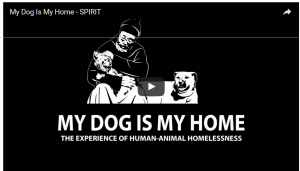Jul
13

Posted by Patricia Devine on July 13th, 2017
Posted in: Public Health
My Do g is My Home is a multimedia project highlighting the importance of homeless people’s relationship with their pets. Researchers from the University of Washington and Wesleyan University focused on the relationships between humans and animals, what those relationships demonstrated and what solutions might address the needs of both. Their article, My Dog is My Home: Multispecies care and poverty politics in Los Angeles, California and Austin, Texas is available here, and seeks to understand the impact that the bond with their pets has on the health and well-being of people.
g is My Home is a multimedia project highlighting the importance of homeless people’s relationship with their pets. Researchers from the University of Washington and Wesleyan University focused on the relationships between humans and animals, what those relationships demonstrated and what solutions might address the needs of both. Their article, My Dog is My Home: Multispecies care and poverty politics in Los Angeles, California and Austin, Texas is available here, and seeks to understand the impact that the bond with their pets has on the health and well-being of people.
The project provides video interviews to tell individual stories, and provides understanding of the steps municipalities can take to support the relationships between people in need and their pets. More homeless shelters, tent cities and subsidized house could accept pets, for example. The My Dog is My Home project also advocates for bigger picture changes such as access to affordable housing and mental health care. Read more about the project here.
 ABOUT Patricia Devine
ABOUT Patricia Devine